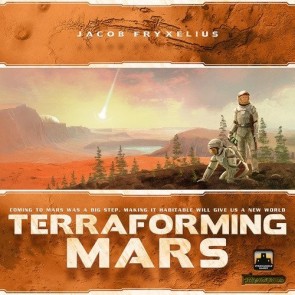In the 2400s, mankind begins to terraform the planet Mars. Giant corporations, sponsored by the World Government on Earth, initiate huge projects to raise the temperature, the oxygen level and the ocean coverage until the environment is habitable. In Terraforming Mars you play one of those corporations and work together in the terraforming process, but compete in doing the best work, with victory points awarded not only for your contribution to the terraforming, but also for advancing human infrastructure throughout the solar systems and other commendable achievements. The players acquire unique project cards, which represent anything from introducing plant life or animals, hurling asteroids at the surface, building cities, and establishing greenhouse gas industries to heat up the atmosphere. You compete for the best places for your city tiles, ocean tiles and greenery tiles. When the terraforming process is complete, the player corporation with the most victory points wins
- Board Games
- Terraforming Mars
Terraforming Mars
Editor reviews
3 reviews
People complain about the "component quality" of the game, but straight up? If you're passing this up for that reason you're missing the point of your time at the table. This game delivers, and that's the primary.
User reviews
---
If you're stumbling in here because you read some reports of this game taking five hours and are currently speechless with apoplexy (like I was) then know that the game actually has a clock—it's just that it's hand cranked by the players themselves. Or not. So... with 5p, a hefty dose of AP, and no one interested in turning the crank, yeah, you're looking down the barrel of an epic-game game day burned to play a mild, engine-building, tile-placement euro. (MAXIMUM SHUDDER)
So play with three (four max) who play quickly and understand that moving the game forward at a good clip toward a satisfactory end is playing well (rather than stalling it out and gumming it up) and it's a pretty good time.
With the right people who play snappy I dig it pretty hard as an emergent narrative / storytelling engine.
---
Here's the deal: Every game is only interesting for so long; good games tend to finish inside this time limit while bad games tend to ignore it (and routinely blow well past it). And so we play with:
- no drafting
- no Corporate Era cards
+ everyone starting at 1 production in all areas
+ Prelude cards
+ "World Government Terraforming" from Venus Next (at the end of each generation the 1st player advances one of the global parameters one step, ignoring all bonuses)
to keep the game peppy, and to leave us wanting more.
Anyhow, last night I played (part of) the first expansion: Hellas and Elysium. All this consists of is a double-sided board with two new maps. Each map has its own new milestones and awards. That alone is enough to completely shift the thinking on what to focus on and what to draft. Last night I would easily have captured a few milestones...from the original board. I had to keep reminding myself that new ones were in play.
Unless you've played the original board a bunch of times, Hellas and Elysium aren't a must-get. The original game packs a lot of variety into it, and I think we've proven you can go far on it alone. But these two board throw in some variety that is appealing to seasoned players. It's a well-done expansion.
I want to buy this. About a month or two until my 6 month "must want for that long" arbitrary rule is up. Unfortunately the game goes in and out of stock very quickly. Trying not to do any FOMO.
On the con side the game was too long. Not in that we played for too long - we had fun playing - but more that it's paced wrong. Or, our game was. We played for 12 turns/generations, and really I would have been fine with the game ending after turn 8. And overall the game should really be 30% less. Less cards on the table (I think I built more than 20 cards), less rounds, and less stuff. I know that it's one of those games where you need to have different options, and I appreciated how you can tailor a specific strategy while still having to change it now and then, but it felt like som of the small things just detracted from the main actions. Why not have animals and microbes on the board, for instance? Or even more stuff you can built and not just have in front of you?
As I said I will play it again, and I can easily see why it's so popular. But it's not a hugely thematic game with a well crafted story. It's a somewhat light if complex euro where all the fluff (card titles and so) match the theme quite well, but I'm not sure the overall structure of the game does.
I can't wait to play it again. I've been playing awful or sub-par games for months so I really appreciate being able to play something I like at last. Also, I want to play Inventrix. I know it's not the best Corporation but it seems interesting to play and I love drawing cards.
I think the goal of animals and microbes is exactly that: To not have them on the board. They are a source of VPs that do not give you any board control yet are intrinsically linked to it.mads b. wrote: it felt like som of the small things just detracted from the main actions. Why not have animals and microbes on the board, for instance? Or even more stuff you can built and not just have in front of you?
M
I started out poorly, with little cash and a lack of focus while he started out rich and with clear terraforming options. While I had bad draws, this was partly a problem I created for myself: Buying energy builds just to play money-making cards is dumb. I mean, if I play Nuclear Power Plant (-2 cash, +3 energy, 10+3 credits) and then two cities (-1 energy,+3 cash) I'm only earning +4 cash after spending 40-50 credits. It's just not a viable plan and it's a good thing I didn't follow it through.
Instead I started focusing on hard cash and science. The money part is self-explanatory and Helion (can use heat as money) made things easier but the science seems a bit strange. I had drawn a science cards and my opponent passed me the Central AI (action, draw 2 cards) so it seemed viable to focus on it, it's an easy way to earn 5 points after all! Fortunately, it proved to be a great strategy as I drew one science-heavy card that gave me a ton of energy, solving all my energy problems. In fact, between the money and that card I ended up racking over 10 energy per turn (!). The reason why I raised it so high is it was more cost-efficient to raise energy than credit production and I figured that, hey, it was going to turn into heat eventually so why not.
The problem was that by the point I got my economy rolling he had a massive advantage in three fronts:
1) He had a 25 point lead (15 on achivements, 10 on terraforming)
2) He had a bunch of temperature-raising asteroids
3) He had powerful oxygen raising cards (Eg. Gain 2 Iron, raise 1 Oxygen)
I decided that if the game ended anywhere on the short term he would win. Hence no matter how good is it to pay 8 credits to create a lake, I couldn't do it if I wanted to win. I had to focus on the other parts of the game and try to win there. I focused on getting as many VP cards as I could and started building some cities to place forests later. I figured I couldn't place the forests until the end, I couldn't help him terraform or risk an early game loss. So this is why I did:
1) I bought the Banker, Scientific and Landlord achivements. This did away with the advantage he had in that regard.
2) I ended the game with 32 VP in cards, he had around 23 so I closed the terraforming lead.
3) The ground game gave me 20VP, he had around 10 so I now had 10 points over him.
And hence, I won. It was a great match! He could have won if he had gone hard and closed the game one turn earlier but he probably didn't expect to lose
--
Something I truly appreciate about the game is that you need secondary victory conditions and they are all very well-made. Even better, when you think about it there are a lot of small strategies scattered through the deck: Animals, city spam, jovians, space cards, discounts, iron generation, microbes, science, card draw...it's not a varied game just because each card is different but because they form a cohesive whole.
There's one related complain I have, though: I think there are a few too many "bad cards". Cards like Interns, Loan, the one-use Inventrix and the like tend to clog up your draws while adding very little to the strategic dimension of the game. By design not all cards should have the same power level or be as generally applicable but these cards do not seem to do anything in the vast majority of games. And while some narrow cards are very interesting (Anti-Gravity, Predators) I don't think that's the case for many of these cards.
In game 2, my wife had the green company so she could make greenery tiles for 7 plants. She went hard at plants and just covered the planet. To boot, she had livestock and a bunch of microbe cards that she just saturated with tokens. Between those two she had like 15 points. She ended with 119 points. I had 93. I did much better than game 1, but not nearly as well as she did.
I finally played both sides of the Hellas and Elysium expansion and had this to say about it:
No board game has so rocked my group like Terraforming Mars. First played in October of last year, it quickly became an unstoppable juggernaut for all of us. We've played it dozens of times and are not slowing down. When this first expansion was announced, we all jumped on it.
It's just a double-sided board, and each side has an alternate map with alternate Milestones and Awards. Otherwise everything is the same.
TM is already a game in which two plays can be very different, depending on how the cards come out, the corporations players use, and strategies. There's already a ton of play in the base set. The new maps add on top of that without complicating the rules any. If you're new to the entire game, in fact, you're at an advantage, because you'll just learn the board you're playing on and not have to fight against months of counting building tags and heat production.
This is a great expansion to a great game. It adds simple plug-in variety with zero fuss.
1) playing cards to your tableau. These will either improve your resource production, improve your endgame score, give you additional action possibilities, or give you board presence
2) advancing the three terraforming conditions: raising oxygen, raising temperature, adding water tiles. these give you points, but also further the game (the game ends when all three are maxed out)
3) claiming VPs through meeting conditions specific to the map you're playing. on each map there are 5 milestones you can claim for endgame points as soon as you meet conditions and 5 awards that you can cause to be evaluated at the end of the game. Only max three of each will be claimed.
4) drafting cards to either avoid giving your opponents things they need or to develop synergies
I can't think of a well-known euro it represents, which is not to say it's completely innovative; it's not. There are over 200 unique cards, there are 12 different player corporations, and now there are three different maps. Even without the expansion, the way the cards come out and the players use their corporations makes each play go pretty differently. On your turn you get 1 or 2 actions. It's not first-come action selection or role selection, but your plans can be thwarted many ways; there's definitely interaction, especially with the drafting.
My group ranges from people who are more into wargames and lighter/trashier games to people who are fed up with scowling dude cube pushers to people who can't get enough euro puzzle boxes to people who are all over the map and pretty much all of them are enamored with this. I added my copy to an order on a whim before the hype train started and at least three others who played my copy went and bought their own. I've never taught it to someone and not have them enjoy it almost right away. I don't know what it is, but there's definitely a there there.
I heavily recommend it. Seeing more cards helps to mitigate bad draws and is fun on its own right! I believe it also makes some of the smaller strategies like Science or Microbes more viable.stormseeker75 wrote: We played our first two games of this over the weekend. First game was with the basic corps, then we played game two with the actual corps. What a difference. We have yet to draft. That will happen soon enough.
I actually like the beginner corporations and rules from a learning standpoint quite a bit.Legomancer wrote: It's interesting that the Basic Corps are considered to be "beginner" because in my opinion they make learning the game harder. You're given a starting hand of 10 cards and no help on focusing on anything; it can be overwhelming. The corporations give you an advantage to work with and at least a starting direction that I think is helpful.
Basically, the issue as I see it is that beginners do not know which cards to keep. Telling them to decide which ones tu buy at a steep cost of 3 when they don't know how the game works is confusing and not fun. Having them start with 10 cards prevents that and also allows them to start experimenting with all the facets of the game. The starting production is similar, I think, it lets novice players understand what iron, titanium, heat and energy do.
I particularly appreciate that only the new player has to play the Basic Corps, you can introduce new players to the game without having to "dumb down" the game for them.
Given the problems I've had teaching Steam, I truly appreciate that they tried to make the game more accessible and did it well. My only issue is that the "Corporation Era" cards are labelled as if they were an advanced variant when the variant is not including them.
This is now one of my favourite games. I'm buying my own copy soon.
@Sagrilagus
I fear I won't be able to give you a good answer so I'll let others tell you instead D:
I think one of the great things about TM is that it does what many games in the genre set out to do without falling into the most usual pitfalls. That is, it's an engine-builder pure and through. It's not a train game or aSplotter title, it covers the same ground as Race for the Galaxy, Agricola just without the bad things that impliesMsample wrote: One thing that makes TM better than most tableau games is that your engine gets to run for awhile before the game ends; too many other games end just as it starts peaking.
- It's competitive: To me this is the most important aspect of the game. In Terraforming Mars if you do not score a point someone else will. It's not a purely positive game, you cannot win if you never try to deny or take advantage of the actions of your opponents.
- Your actions change the game and force opponents to react: In, say, Lords of Waterdeep the actions of your opponent are irrelevant in that what they do barely changes your plans. You could more or less replace them with a random blocking of spaces and little will change. You do not take really take into consideration beyond a new building popping here and there Here that's not true, here you must steer the board and the game so that you are the one beneffiting fom the terraforming instead of your opponents.
- It's somewhat tight and leans strategic: Compared to other engine-builders the resources in this game are tight. You are always short in money, always short in cards and there's a real feeling of having to choose. You won't inevitably snowball and you have to make sacrifices early on to be able to score later.
- It's fun and easy to play: I think this is a very accessible title. It's simple and can be played with practically everyone without much of a fuss.
Is Terraforming Mars going to become a modern classic in the vein of Age of Steam and Cosmic Encounter? Probably not. It's probably closer to something like Caylus, Chaos in the Old World or Eclipse: Great at what it does but bound to gradually become passé. Not that it matters when you are loving every game.
Hope that helps.
For me, the player mats suck pretty badly. I tend to bump stuff, which means that my income cubes tend to wander all over the mat. Although this can be strategically valuable, I guess I'd rather not have to round up cubes every other turn. So I'm trying to put my wife's Cricut machine to work by cutting chipboard player aids to hold the cubes in place. I'm going to blow the mat up to 125%, and make a cube wrangler to lay on top of the income grids.
I've seen a couple of other ideas that might work instead. Another one is to glue a magnetic sheet under a player mat, and glue 8mm rare earth magnets under 12 or so player cubes per side. Yet another is to glue self-fusing tape onto the player mat and cubes. Of course if you have a laser cutter or a CNC router, the world is your oyster.
Erik Twice wrote: Is Terraforming Mars going to become a modern classic in the vein of Age of Steam and Cosmic Encounter? Probably not. It's probably closer to something like Caylus, Chaos in the Old World or Eclipse: Great at what it does but bound to gradually become passé. Not that it matters when you are loving every game.
Hope that helps.
You watch your tongue.
I'm actually a bit unsure why I used Chaos as an example since it doesn't seem to fit my example that well. It's hard to explain what I mean, I just think it's a good game but that it might not become a referrent? Something like that.Stonecutter wrote: You watch your tongue.
I bought some wooden mats for the cubes. They cost me 25€ which is expensive (50% of the game's cost) but after thinking about it I got them. It's a game I want to play a lot and if I play it a hundred times then it's worthwhile (So far I have 30+ games between multiplayer and solo games).
One of my friends bought the Broken Token TM kit, which is a touch expensive for an add-on, but really nice. For me, keeping the cubes from getting knocked off the mat is 90% of the battle. It might be worth it, though. Maybe I can hypnotize the wife, since our anniversary is coming up.
Erik Twice wrote: I bought some wooden mats for the cubes. They cost me 25€ which is expensive (50% of the game's cost) but after thinking about it I got them. It's a game I want to play a lot and if I play it a hundred times then it's worthwhile (So far I have 30+ games between multiplayer and solo games).
You think that's expensive‽ I just bought the expansion. Half the price of the game, but with only a board and none of the cards. Clearly we need government intervention to prevent abuse of the vulnerable hobby game market.
Well, I do think that paying 50% more just so bumping the table doesn't ruin the game is pretty expensive. I'm fine with the expansion since it's a piece of design and adds something sustantial, it's not a semi-mandatory component upgrade to address one of the game's flaws.dysjunct wrote: You think that's expensive‽ I just bought the expansion. Half the price of the game, but with only a board and none of the cards. Clearly we need government intervention to prevent abuse of the vulnerable hobby game market.
Keep in mind I'm unemployed and my transportation pass takes more than 50% of my parent's stipend.
dysjunct wrote:
Erik Twice wrote: I bought some wooden mats for the cubes. They cost me 25€ which is expensive (50% of the game's cost) but after thinking about it I got them. It's a game I want to play a lot and if I play it a hundred times then it's worthwhile (So far I have 30+ games between multiplayer and solo games).
You think that's expensive‽ I just bought the expansion. Half the price of the game, but with only a board and none of the cards. Clearly we need government intervention to prevent abuse of the vulnerable hobby game market.
The expansion rules. It adds a ton more variety with zero extra rules, and fits in the original box. That's value.
 Games
Games How to resolve AdBlock issue?
How to resolve AdBlock issue? 











